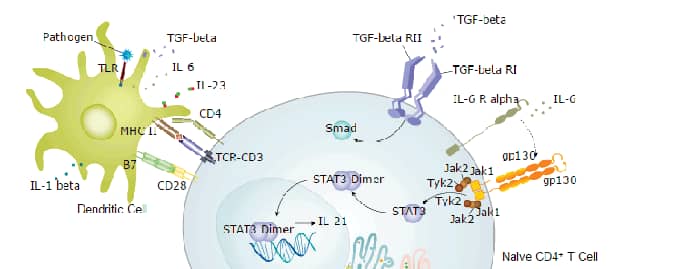Canine IL-6 Biotinylated Antibody Summary
Thr23-Met207
Accession # P41323
Applications
Canine IL-6 Sandwich Immunoassay
Please Note: Optimal dilutions should be determined by each laboratory for each application. General Protocols are available in the Technical Information section on our website.
Scientific Data
 View Larger
View Larger
IL‑6 in Canine PBMCs. IL-6 was detected in immersion fixed canine peripheral blood mononuclear cells (PBMCs) treated with Concanavalin A using Goat Anti-Canine IL-6 Biotinylated Antigen Affinity-purified Polyclonal Antibody (Catalog # BAF1609) at 15 µg/mL for 3 hours at room temperature. Cells were stained using the NorthernLights™ 557-conjugated Streptavidin (red; Catalog # NL999) and counterstained with DAPI (blue). Specific staining was localized to cytoplasm. View our protocol for Fluorescent ICC Staining of Non-adherent Cells.
Reconstitution Calculator
Preparation and Storage
- 12 months from date of receipt, -20 to -70 °C as supplied.
- 1 month, 2 to 8 °C under sterile conditions after reconstitution.
- 6 months, -20 to -70 °C under sterile conditions after reconstitution.
Background: IL-6
Interleukin 6 (IL-6) is a pleiotropic alpha -helical cytokine that plays important roles in acute phase reactions, inflammation, hematopoiesis, bone metabolism, and cancer progression. IL-6 activity is central to the transition from acute inflammation to either acquired immunity or chronic inflammatory disease. It is secreted by multiple cell types as a 22-28 kDa phosphorylated and variably glycosylated molecule (1-4). Mature canine IL-6 is 187 amino acids (aa) in length and shares 76%, 59%, 38%, and 40% aa sequence identity with feline, human, mouse, and rat IL-6, respectively (5). IL-6 induces signaling through a cell surface heterodimeric receptor complex composed of a ligand binding subunit (IL-6 R) and a signal transducing subunit (gp130). IL-6 binds to IL-6 R, triggering IL-6 R association with gp130 and gp130 dimerization (6). gp130 is also a component of the receptors for CLC, CNTF, CT-1, IL-11, IL-27, LIF, and OSM (7). Soluble forms of IL-6 R are generated by both alternate splicing and proteolytic cleavage (3). In a mechanism known as trans-signaling, complexes of soluble IL-6 and IL-6 R elicit responses from gp130-expressing cells that lack cell surface IL-6 R (3). Trans-signaling enables a wider range of cell types to respond to IL-6, as the expression of gp130 is ubiquitous while that of IL-6 R is predominantly restricted to hepatocytes, leukocytes, and lymphocytes (3). Soluble splice forms of gp130 block trans-signaling from IL-6/IL-6 R but not from other cytokines that utilize gp130 as a coreceptor (4, 8).
- Van Snick, J. (1990) Annu. Rev. Immunol. 8:253.
- Hodge, D.R. et al. (2005) Eur. J. Cancer 41:2502.
- Jones, S.A. (2005) J. Immunol. 175:3468.
- Rose-John, S. et al. (2006) J. Leukoc. Biol. 80:227.
- Kukielka, G.L. et al. (1995) Circulation 92:1866.
- Murakami, M. et al. (1993) Science 260:1808.
- Muller-Newen, G. (2003) Sci. STKE 2003:PE40.
- Mitsuyama, K. et al. (2006) Clin. Exp. Immunol. 143:125.
Product Datasheets
Citations for Canine IL-6 Biotinylated Antibody
R&D Systems personnel manually curate a database that contains references using R&D Systems products. The data collected includes not only links to publications in PubMed, but also provides information about sample types, species, and experimental conditions.
3
Citations: Showing 1 - 3
Filter your results:
Filter by:
-
Increased CCL-5 (RANTES) Gene Expression in the Choroid Plexus of Dogs with Canine Leishmaniosis
Authors: José Eduardo dos Santos Silva, Giulia Gonçalves Jussiani, Fernanda Grecco Grano, Maria Cecília Clarindo Pelissari, Guilherme Dias de Melo, Tatiane Terumi Negrão Watanabe et al.
Animals (Basel)
-
Toll-like receptors and cytokines in the brain and in spleen of dogs with visceral leishmaniosis
Authors: Fernanda G. Grano, José Eduardo dos S. Silva, Guilherme D. Melo, Milena S. de Souza, Valéria M.F. Lima, Gisele F. Machado
Veterinary Parasitology
-
Autocrine effects of interleukin-6 mediate acute-phase proinflammatory and tissue-reparative transcriptional responses of canine bladder mucosa.
Authors: Wood MW, Breitschwerdt EB, Gookin JL
Infect. Immun., 2010-11-29;79(2):708-15.
Species: Canine
Sample Types: Whole Tissue
Applications: IHC-Fr
FAQs
No product specific FAQs exist for this product, however you may
View all Antibody FAQsReviews for Canine IL-6 Biotinylated Antibody
There are currently no reviews for this product. Be the first to review Canine IL-6 Biotinylated Antibody and earn rewards!
Have you used Canine IL-6 Biotinylated Antibody?
Submit a review and receive an Amazon gift card.
$25/€18/£15/$25CAN/¥75 Yuan/¥2500 Yen for a review with an image
$10/€7/£6/$10 CAD/¥70 Yuan/¥1110 Yen for a review without an image












